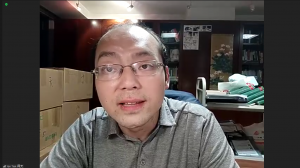
The second session of the China Law Week 2020 was held under the theme “Chinese Labour Law in International and Comparative Perspectives”. The Chair of the session was Professor Ninon Colneric, former Judge at the Court of Justice of the European Communities and Co-Dean at the China-EU School of Law at the China University of Political Science and Law.

Sean Cooney, Professor of Law at Melbourne Law School, University of Melbourne held the first presentation on labour and employment law challenges of digital platform-based employment. These platforms provide flexibility and opportunities for the workers and convenience for the consumers. However, empirical studies show that this new method of organizing labour is not without problem. The main questions addressed during the presentation are: should the workers be treated as employees, what collective bargaining should be allowed, how do the workers access social protection systems, and what methods are used for dispute resolution.

The second presentation by Ulla Liukkunen, Professor of Labour Law and Private International Law at the University of Helsinki and Director of the Finnish China Law Center was entitled “International Employment Contracts in China – the Influence of Labour Law and Private International Law (PIL) Trends”. The presentation discussed Chinese PIL and cross-border labour questions about international employment contracts. She noted that in China, PIL is still a young field of law with a late policy start. The development of Chinese PIL requires broader attention as labour rights need safeguards in a cross-border setting that substantive law alone cannot afford.

The third presentation “Labor Disputes of Chinese Posted Workers in the B&R Countries” was held by Yan Dong, Vice-Dean and Associate Professor at Beijing Foreign Studies University School of Law . He presented his research about Chinese workers posted in B&R countries. The number of Chinese posted workers increased gradually. However, the current literature gap exists. Data about workers’ labor issues in the B&R countries is incomplete. There are insufficient legal rules about applying Chinese labour laws under the doctrine of overriding mandatory rules. The research design is to collect all the cases by investigating the labor dispute in the B&R countries. The aims of Professor Dong’s study are to uncover the labor issues and test the doctrine of overriding mandatory labor rules in action.

The fourth presentation was given by Ronald C. Brown, Professor of Law at the University of Hawai’i Law School . In his presentation, he discussed how the Covid-pandemic has affected labour law in China and the US. When looking at reported cases and deaths, China has survived the pandemic more successfully. The presentation looked at reasons in labour law changes that contributed to this feat. On a high level, the approaches were very similar: funding packages, lockdowns, and mask recommendations, but the results were different. The presentation showed comparatively how high level policies were implemented and how the different cultures reacted to the response on a micro level.

The session closed with a presentation by Yan Tian, Assistant Professor and Assistant Dean at Peking University Law School. His speech was about the images of workers on China’s law of bankruptcy. Professor Tian first compared the old and new laws of bankruptcy to observe the changes in the images of workers. Secondly, he compared the laws of bankruptcy and the Chinese constitution. Finally, Professor Tian compared the past and future of the laws of bankruptcy.
The Center would like to thank our interns, Jakub Pincha, Zhe Zhao, Li Yuan, and Johanna Fähnrich for contributing text for this article.
